Incident Roles
Define responder roles and responsibilities for efficient incident management.
Incident Roles allow you to customize a set of roles that you can assign during an incident. An established set of Incident Roles clearly defines incident responsibilities, promotes accountability, and enables efficient response.
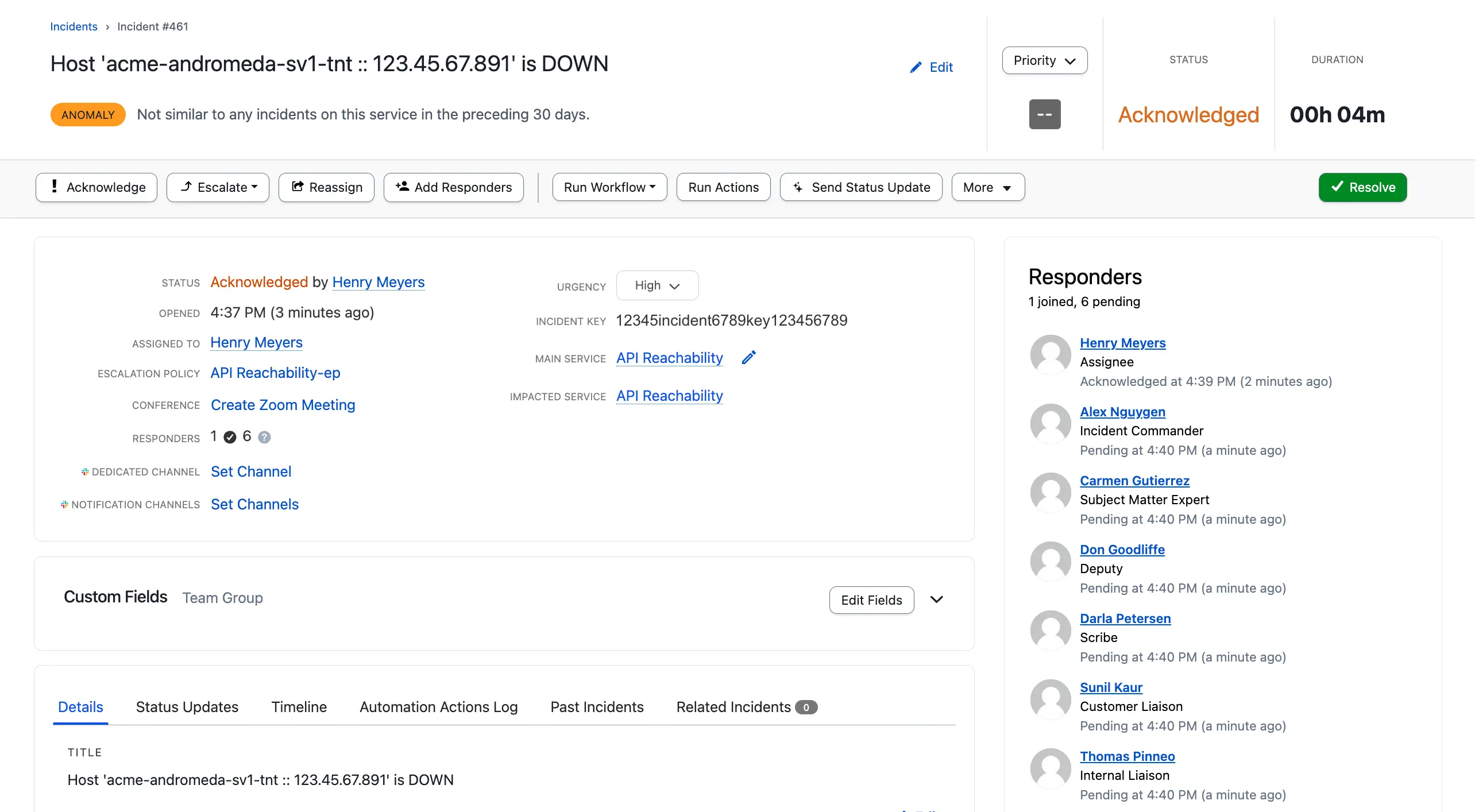
Incident Roles in Responders list
Availability by Plan
Professional Business Enterprise Predefined Roles (Incident Commander, Customer Liaison) ✔️ ✔️ ✔️ Custom Roles One 10
(for a total of 12 incident roles)Contact the Sales Team want if you would like to upgrade or expand your Incident Roles feature set.
Incident Response Guide
For more information on how teams at PagerDuty use roles in their incident management process, refer to the Incident Response Guide.
Default Incident Roles
There are two default Incident Roles:
- Incident Commander
- Customer Liaison
These roles are enabled or disabled based on your account plan. You may need to enable these roles to use them on incidents.

Create Incident Roles
Required User Permissions
Global Admins and the Account Owner can create, edit, and delete account-wide Incident Roles.
Note
Creating roles is available only of certain plans. Refer to the Availabilty by Plan note above.
-
Navigate to Incidents Incident Roles.
-
Click New Role and enter the following:
| Field | Description |
|---|---|
| Display Name | A role name to display on incidents. |
| Role Name | A unique name for API use. This name can only contain lowercase letters, numbers, and underscores. Note: You cannot change the Role Name after role creation. |
| Description | Help responders understand the scope of the role and how they should use it. |
| Disable Incident Role | Enable or Disable depending on your preference. If disabled, the role will no longer appear on incidents. Existing incident roles and assignees remain unaffected. |
- Click Create Role.
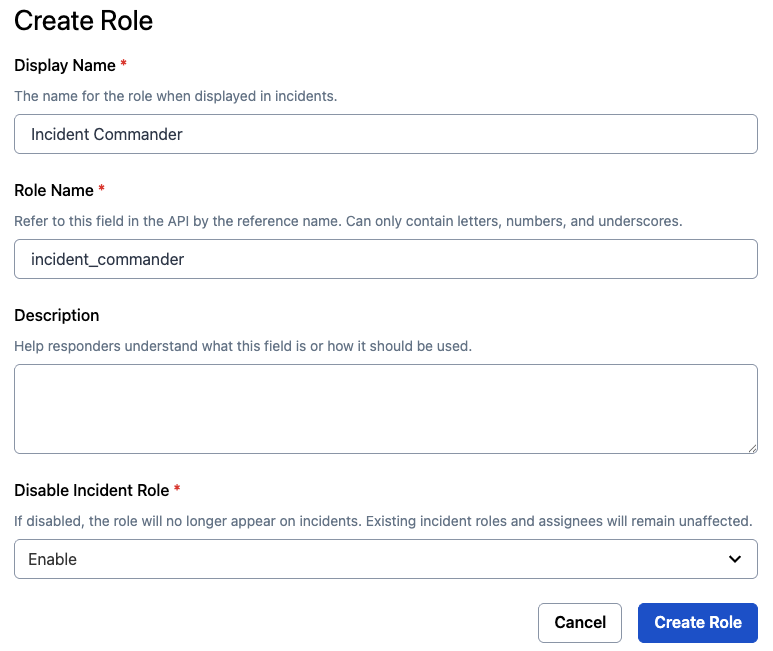
Edit Incident Roles
- Navigate to Incidents Incident Roles.
- Click on the role you want to edit.
- Edit the role details as desired.
| Field | Description |
|---|---|
| Display Name | Edit the role name. |
| Description | Edit the description to help responders understand the scope of the role and how they should use it. |
| Disable Incident Role | Select Enable or Disable depending on your preference. If disabled, the role will no longer appear on incidents. Existing incident roles and assignees will remain unaffected. |
- Click Save Changes.
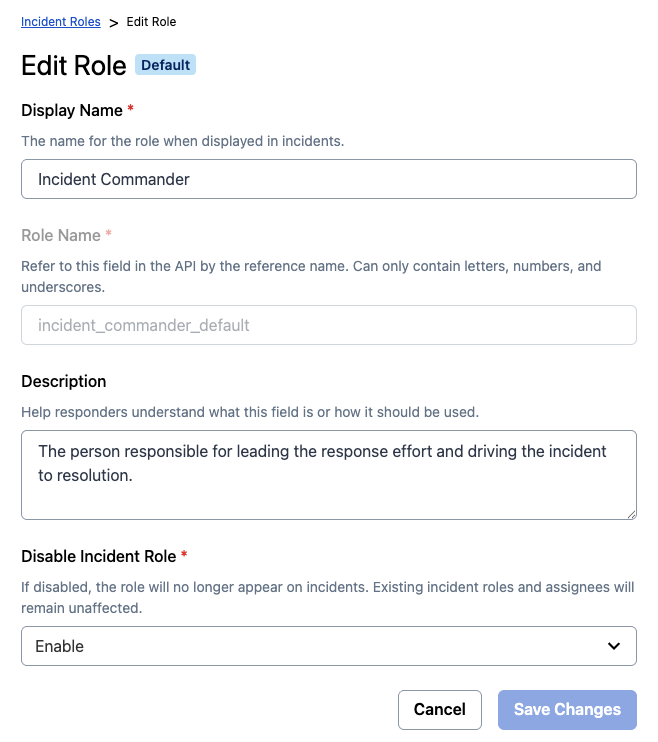
Enable or Disable Incident Roles
To enable or disable an existing Incident Role:
- Navigate to Incidents Incident Roles.
- In the overflow menu next to the role you want to disable or enable, click Enable or Disable.
Delete Incident Roles
Deletion Warning
You cannot recover an Incident Role after deleting it.
- Navigate to Incidents Incident Roles.
- In the overflow menu next to the role you want to delete, select Delete. A confirmation prompt appears to confirm if you want to delete the role, as this action cannot be undone.
- Type Delete in the text box.
- Click Delete to confirm.
Assign an Incident Role
Once you have created an Incident Role, you can assign the role to an incident responder.
Behavior When you Assign Roles to Non-Responders
If you assign a role to a user who was not already a responder on the incident, this action will add them as a responder. The responder request will include the role assigned to the user.
You can assign an incident role in multiple ways:
Assign an Incident Role in the Web App
You can assign incident roles to individual users or to escalation policies. When you assign a role to an escalation policy, it sends a responder invite to the on-call responder. Once accepted, PagerDuty assigns them to the role. If they do not accept the responder request before the escalation timeout, PagerDuty escalates and notifies the next level of the escalation policy.
Requirements
- A user who can take action on the incident (Responder permissions or higher) can assign Incident Roles in the web app.
- You cannot assign roles to Stakeholders.
Follow these steps to assign an incident role:
- When viewing an incident, in the Responders list on the right, click Assign Roles.
- Select the dropdown for your preferred role to view the list of available responders.
- Select an Escalation Policy or User from their respective tabs to assign them to the corresponding Incident Role.
- Click Save.
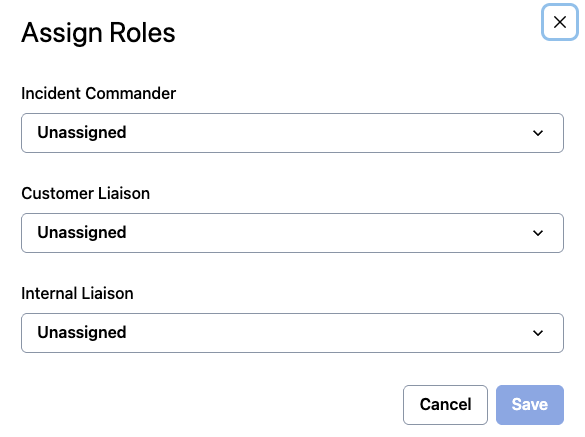
Assign or edit roles

Responder request with Incident Role
Assign an Incident Role in Slack
You can assign Incident Roles from a PagerDuty incident notification in Slack.
Requirements
- You must configure the Slack Integration to assign Incident Roles in Slack.
- You must have Responder permissions or higher to assign Incident Roles in Slack.
Follow these steps to assign an incident role in Slack:
- In a Slack Workspace integrated with the PagerDuty app, navigate to a PagerDuty incident notification.
- Click More Actions Assign Roles.
- Click the Select dropdown to view the list of available responders.
- Select a user to assign them to the corresponding Incident Role.
- Click Save.
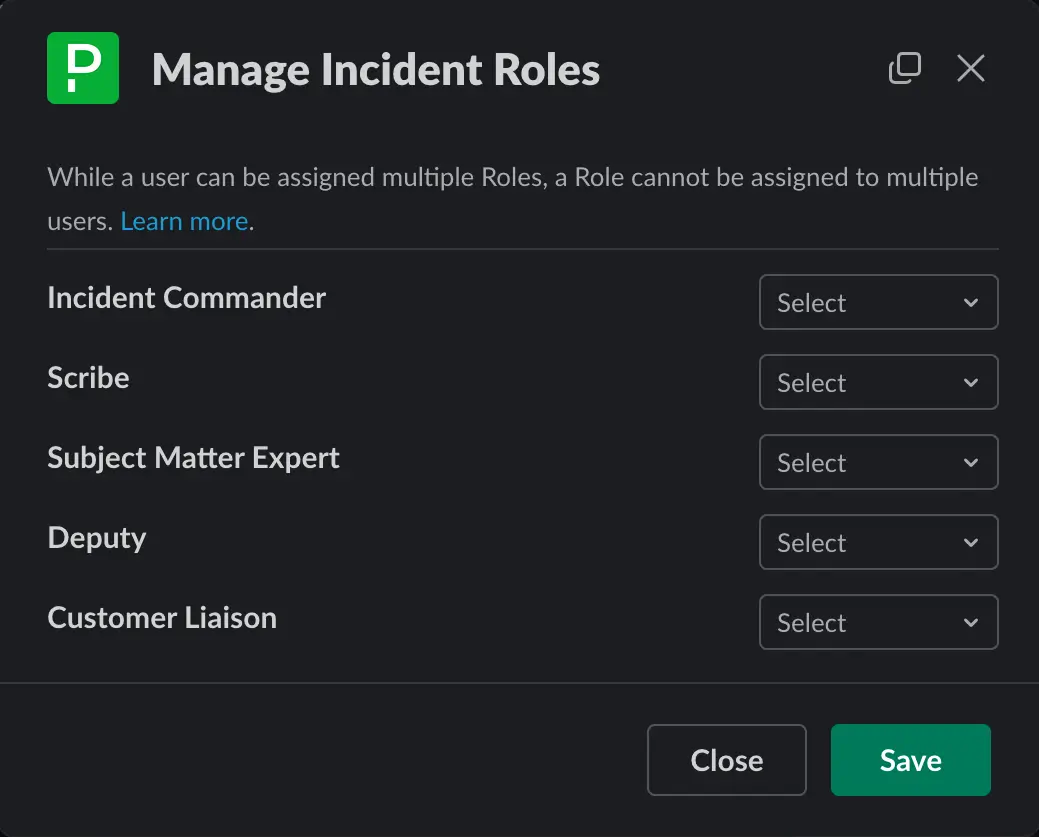
Assign an Incident Role in Microsoft Teams
You can assign an Incident Role from a PagerDuty incident notification in Microsoft Teams.
Requirements
- You must configure the Microsoft Teams Integration in order to assign Incident Roles in Teams.
- You must have Responder permissions or higher to assign Incident Roles in Teams.
Follow these steps to assign an incident role:
- In a Microsoft Teams chat integrated with the PagerDuty app, navigate to a PagerDuty incident notification.
- Click the overflow menu and select Assign Roles.
- Click the Type to search for a user dropdown and begin typing to search for a user.
- Select a user to assign them to the corresponding Incident Role.
- Click Save.

Assign an Incident Role With Incident Workflows
After creating incident roles, you can assign or unassign them using Incident Workflows. It allows you to automate role assignments based on predefined workflow conditions, reducing manual work in your Incident Management processes.
Learn more about assigning roles via Incident Workflows.
FAQ
Can I assign the same Incident Role to multiple responders?
No. You can only assign Incident Roles to a single responder at any given time. This promotes accountability during response by eliminating shared ownership.
Can I assign multiple roles to one user?
Yes, you can assign multiple roles to a single user.
Where are Incident Roles available in PagerDuty?
Incident roles are available in the web app, Slack, Microsoft Teams, and Incident Workflows.
Updated 28 days ago
